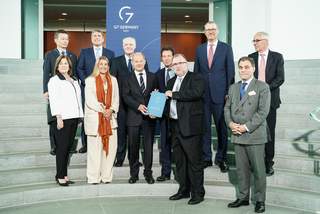
© Bundesregierung/Denzel
Business 7 Germany: Shaping Globalisation Together
In late June 2022, the B7 Germany Summit featured public high-ranking panel discussions on major global challenges and the potential for G7 cooperation with business insights. 124 days into the Russian war of aggression, the global business environment is forever changed and after two years of the ongoing Covid-19 pandemic, the B7 examined the current and future challenges facing the economy. The B7 principals had the honor to present the B7 communiqué and panel recommendations to Federal Chancellor Olaf Scholz.
What role can value-based partnerships play? What contribution can climate clubs make? How should the future of health systems be shaped to better prepare for pandemics? These questions were the focus of this year’s B7. We are convinced, especially in times of crisis, that the open exchange of opinions, ideas and analyses is crucial for developing joint solutions.
In three panels, speeches and web talks the B7 summit convened a total of 18 high-level speakers, on site in the Verti Music Hall and thousands of online viewers in front of their screens. Among the B7 2022 highlights were remarks from Punit Renjen (Global CEO, Deloitte), Suzanne Clark (President and CEO, U.S. Chamber of Commerce), Lord Karan Bilimoria CBE DL (President, CBI), and Birgit Schwenk (Director General for Climate Action, Federal Ministry for Economic Affairs and Climate Action).
Business of Business is Business
In his opening speech, Punit Renjen, the global CEO of Deloitte, explained that the serious crises of our time show the connection between society and business through a new lens. One cannot be successful if the other is not. For this reason, a new holistic business approach is needed that puts long-term social impact at the centre of its mission. In this way, Renjen positioned himself against the view that the profit motive on its own is the current way to do business.
This approach was also supported by Suzanne Clark in the panel discussion on decarbonising industry. The common sense of the debate consisted of the assumption that in the future, a common set of standards is necessary to make a way of progress towards shared goals between the B7.
Final Communiqué
At the end of the B7 summit, Federal Chancellor Scholz received the Business 7 principals for talks at the Chancellery. The communique reaffirms that the B7 stands firmly behind the sanctions against Russia. Furthermore, the B7 urges G7 governments to use dynamic economic policies to drive business investment, create jobs and help business stimulate employment-rich growth after and despite the war. The goal for the next few years is a more comprehensive resilient economy. Moreover, the B7 urges the G7 economies to grow their resilience between diversification of supply chains, building business alliances with trustworthy and like-minded partners, joint projects, and pioneering industrial standards. Reinforcement of sovereignty must in no way lead to protectionist tendencies, overcapacity, or market distortions.
German industry looks forward to undergoing an analysis of the G7 response to the B7 and stands at the ready to support the G7 in its further work as well as for the trade ministerial in September 2022.



